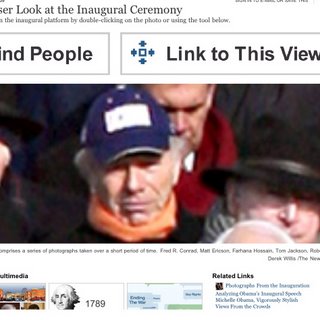 Several people have suggested I join Twitter, the microblogging service. With a 140 character “tweet” or “twit ” you can send off a tiny little message to those that follow you. It’s all the rage now with blogging lawyers, and there’s 565 on this growing list. Heck even Barack Obama tweets (though the prior list somehow missed the First Lawyer).
Several people have suggested I join Twitter, the microblogging service. With a 140 character “tweet” or “twit ” you can send off a tiny little message to those that follow you. It’s all the rage now with blogging lawyers, and there’s 565 on this growing list. Heck even Barack Obama tweets (though the prior list somehow missed the First Lawyer).
But I’ve resisted. My brain is being swamped with information and my days seem to be getting shorter as I try to stay current:
- I have 150-200 blogs in my RSS feed;
- I have a local listserv that is, shall we say, exceptionally active in all things related to my practice;
- I’ve joined Facebook, which I rarely visit, and when I do, I find out what people had for breakfast;
- I’ve joined Linkedin, which I visit even less often.
I read hard copy magazines and newspapers. I write this blog. I’ve got a wife, two kids, a dog and a cat. I’m training to run another marathon, and organizing a 1/2 marathon trail race. And, oh yes, I have a law practice to run with clients to attend to.
The internet and the burgeoning social networks that it has spawned have made it possible to acquire information in ways that our parents never envisioned. Information now pours over the transom in an unprecedented deluge, being pushed and pulled in myriad ways.
But at some point I need to stem this tide. I’m not looking to retreat to a cabin in the woods, eating grubs to survive and working on an anti-technology manifesto, but I also don’t feel a compelling need to open every valve of the technology river. There are only 24 hours in the day, and yes, I like to also use some of them to eat and sleep.
It is true that there are times I would like to make a very short post, but a once-a-week round-up of linkworthy items on this blog seems to be efficient enough for that purpose. And I have to think that those that would “follow” me on Twitter already follow me their RSS feed or by subscription, so little would seem to be gained by way of a growing readership.
Twitter really seems like an updated version of a listserv, which has served me quite well over the years. I’ve previously covered that subject (The Million Dollar Listserv), writing that “The listserv may be the single greatest tool the solo or small practice lawyer has,” and if you don’t belong to one in your practice area, you really should find or create one. You can read that post to see why. Twitter doesn’t seem to improve on it in any meaningful way, and when you supplement the listserv with RSS feeds the ground is pretty well covered.
There are some that think Twitter’s great for breaking new stories, but that’s really nonsense. For example, some “credit” Janis Krums with using Twitter to “scoop” mainstream media with a first photo of the US Airways splash landing in the Hudson. Krums was on the first ferry to reach the plane. The WSJ wrote, “Notch another win for citizen journalism,” and the Daily News called his 15 seconds of fame “well-deserved.”
Why, on godsgreenearth anyone would think this is a “well-deserved” “win” of any kind and relevant to any serious issue of news reporting is beyond me. Why would it matter that someone twittered about a loaded airplane going down in full view of thousands of people on the edge of the biggest city in the country — other than to the guy who took the picture and spent his time twittering it to friends? Did Twittering save lives? Of course not. Rescue was already in progress.
While Krums was being lauded as a celebrity, I wanted to know why the hell he was spending time on his iPhone instead of asking the crew what he could do to help, getting life vests ready to toss overboard, looking for survivors in the frigid waters, and looking around to see where, if at all, there might be lifeboats that he might need to assist with. Obsessiveness to technology can also mean the difference between life and death.
And then there is LexTweet — a project of Kevin O’Keeffe’s Lexblog business that builds sites for lawyers — where the twittering is all about law. Or at least that may have been his thought when starting it. According to O’Keefe, “The community has already grown to over 1,500 members. But when I checked it out I found these pearls of twittering show up on his service:
- Is about ready to make some creamy broccoli cheese soup…yummy! (Melby_AZ)
- Have a serious craving for macaroni & cheese… might have to go to Garden of Eden. (Chickpea)
- OK, finally made it to library, rocking out to “Lavalounge” via live365.com, and reading Crim Law. Woot for law school (Littlefrogling)
- Our four year old has just admitted that she is being bullied at school. ipod is switched off… Kids are so cruel. (Accidentclaim)
Who wants to sort through this crap looking for substance? Thanks, but I have enough to do. Even if I knew these people I wouldn’t want to read this dreck.
Now I don’t blame O’Keefe for putting that content up, or even encouraging it. He’s the platform builder, not the content creator. But it doesn’t help to claim 1,500 twittering lawyers if these are among the ranks.
I’m not saying I will never Twitter. It certainly has its place as yet another method of information sharing. It’s just that I don’t see the need, given that I already can’t read all the information that comes in. And it doesn’t seem to be any improvement over a simple listserv or bulletin board with threaded subjects. And that type of technology was in wide use in the mid-90s.
Will Twitter help me acquire yet more information that I can’t get to, or assist me in sharing information that I might have? I don’t see how.
For more on twittering lawyers:
- Twitter users going to LegalTech New York : Here’s a list (Kevin O’Keefe @ Lexblog),
Here’s a list of Twitter users [53 and counting] I know who are attending. If you’re not on the list, leave a comment, or drop me a tweet at @kevinokeefe so we can get you on the list.
- they’re all atwitter (we’re not) (David Giacalone @ f/k/a)
Everywhere you look, well-known members of the blawgisphere (lawyers who have weblogs) are all atwitter, chirping excitedly about Twitter …At risk of being called a twit (or a throwback), the f/k/a Gang is pre–emptively opting out.
- Blawg Review #186: The Twitter Wars (at the Res Ipsa Blog)
Twitter, a cross between “social networking, blogging, and texting,” took center stage this week as legal bloggers debated the usefulness of the new networking platform. For a run down and the new technology and reasons why some attorneys are not embracing it [read the rest of the post with the links]
- Twitter for Lawyers (David Harlow @ HealthBlawg)
I’ve been twittering for a couple of months now, and the consensus seems to be that I’m just one of those bleeding-edge geeks with too much free time. I bet I would’ve gotten the same reactions from fellow lawyers if I had installed a telephone in my office back in the 1870s.
- First Impression of The Lextweet Reflection (Greenfield @ Simple Justice)
Kevin O’Keefe is always on the hunt for the next big thing, and what to do about it. His latest creation is Lextweet, billed as means to “follow legal community members who use Twitter to discuss the law and much more.” … But the biggest issue has nothing to do with Lextweet at all. The vast majority of twits are, how do I say this nicely, worthless to the general lawyer audience. Nothing personal, but intimate details of your personal hygiene don’t interest me. I don’t know your family (I don’t even know you) so it’s really of little concern what they’re having for breakfast. But this is what people twit about, and what shows up on Lextweet whether it matters or not.
- How I Use Twitter — Let me count the ways (Grant Griffiths @ Blog for Profit)
Since I spend some of my time visiting with real-world friends and business contacts and individuals online about twitter, I thought it might be time to provide a post on “how I use twitter.”
- Sixteen Reasons to Tweet on Twitter (Robert Abrogi @ Law Marketing Portal)
1. Expand your network. With blogging, writing, speaking and various bar committees, I consider myself pretty well networked. So I was surprised upon joining Twitter at how many new contacts I made, how quickly I made them, and their potential value to me as a professional.
- Attorneys Flocking to Twitter for Marketing (Larry Bodine @ Law Marketing Blog)
From where I’m sitting, 2009 will be the year Twitter becomes the major business development trend. Why?
Links to this post:
blawg review #203
on drunkenness oh drunkenness thou poison of society what a hydra headed monster art thou! like the pestilence thou walkest among the children of men and ruin follows with fatal precision in the tracks of thy footsteps. …posted by Geeklawyer @ March 15, 2009 8:00 PM
to twitter or not to twitter: that is the question for lawyers
over the past nine months or so, twitter, a micro-blogging service that enables users to communicate with each other in 140-character spurts has steadily gained traction with lawyers. some lawyers regard twitter as a bit of time sink in …posted by @ February 23, 2009 2:34 PM
twittering from the mediation table: social media come to adr
i recently joined twitter. twitter, for those of you not yet familiar with this social media tool, is a social and business networking, microblogging, and instant messaging service. messages sent via twitter are short, limited to 140 …posted by Diane Levin @ February 05, 2009 4:50 AM
quickies and white lies
no, this post isn’t about guys who break-up with you just before valentine’s day. it contains a few follow-ups and forecasts about sex offender laws, schenectady’s felonious ex-police chief, the future of the legal blogiverse, …posted by David Giacalone @ February 03, 2009 10:37 AM
the (swift-sluggish-frozen-thawing-swollen-dammed) fickle river of …
prof. yabut is almost sixty years old. by now, he should have resigned himself to the strange and subjective elasticity of time; or, at least ceased to be surprised by it. nonetheless, over the past few days, as january rushes/drags to …posted by David Giacalone @ January 31, 2009 5:32 PM
why do lawyers who don’t use twitter feel the need to diss twitter?
new york city injury lawyer eric turkewitz, who is not only a first rate plaintiff’s trial lawyer, but also a heck of a fine person, is the latest lawyer to question the value of twitter. eric doesn’t say he’ll never use twitter, …posted by [email protected] (Kevin) @ January 26, 2009 12:56 AM
why do lawyers who don’t use twitter feel the need to diss twitter?
new york city injury lawyer eric turkewitz, who is not only a first rate plaintiff’s trial lawyer, but also a heck of a fine person, is the latest lawyer to question the value of twitter. eric doesn’t say he’ll never use twitter, …posted by [email protected] (Kevin) @ January 26, 2009 12:56 AM


